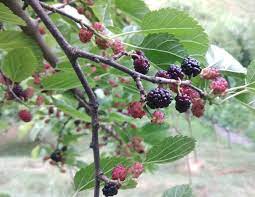
Known for its mesmerizing beauty, the flora and fauna in Jammu Kashmir is under deep threat due to government’s lackadaisical approach towards the intense poaching of wild animals, exploitation of rare medicinal plants and above all habitat destruction.
Several medical plants besides some birds and animals are on verge of extinction and half hearted efforts of the government and other non-governmental organizations aren’t bearing any fruits on ground.
Now, King Mulberry popularly known as Shah-Tul (Morus Nigra) is also on the verge of extinction in Jammu Kashmir.
Officials from Sher-e-Kashmir University of Agricultural Sciences & Technology of Kashmir (SKUAST) told news agency—Kashmir News Observer (KNO) that Shah-Tul was brought to Kashmir from Iran very early.
Officials said that the main aim to propagate the mulberry varieties is that its leaves can be used for rearing silkworms.
“However, the Shah-Tul bears more fruit than leaves and people hardly prefer to grow Shah-Tul,” they said.
Growers from different areas of Kashmir said that they planted Shah-Tul mulberry trees but even after grafts plants didn’t survive at most places.
They said that Shah-Tul mulberry trees which bear very delicious fruits are rare now and hardly only few old trees of such varieties exist now.
Dr Irfan Lateef Khan, assistant professor at SKUAST while talking with KNO said that they are encouraging cultivation of Shah-Tul and since last two three years varsity has developed plants of this rare variety which are being distributed among people who are also being educated on how to grow them.
“This mulberry variety is rich in nutrients, rich in vitamin C as well as antioxidants besides that it contains less sugar and can be used by diabetic patients,” Khan said.
Khan said that the technology has been developed to make Shah-Tul syrup and jams.
“We are more focused in developing plants that are suitable for silkworm rearing, however, this variety isn’t too suitable for that as compared to other varieties,” he said.
“There is a demand for the fruit of Shah-Tul mulberry and we have developed technology for it and we have plants available and are shifting them in different nurseries,” Khan said.
“It is our duty to preserve our biodiversity as we won’t allow it to become extinct. We have started its plantation on a large scale so that we won’t lose mulberry wealth,” Khan said—(KNO)




